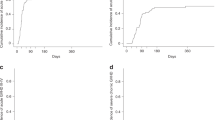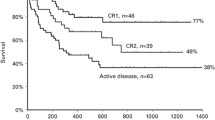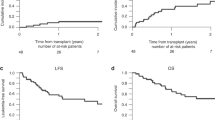Abstract
Reduced-intensity conditioning (RIC) regimens can cause decreased non-relapse mortality (NRM) but lead to higher relapse rates in higher-risk myelodysplastic syndrome (MDS). However, relapse is not the main problem after hematopoietic cell transplantation (HCT) in lower-risk MDS, and post-transplant outcomes may therefore improve with less intense non-myeloablative conditioning (NMC) regimens. We here report the results of a single-center feasibility study of NMC with cyclophosphamide-fludarabine-antithymocyte globulin (CyFluATG) in MDS patients with bone marrow blasts <5 %. We compared post-transplant outcomes between CyFluATG and a RIC regimen, busulfan-fludarabine-antithymocyte globulin (BuFluATG). Fifteen MDS patients received allogeneic HCT after CyFluATG conditioning comprising cyclophosphamide (100 mg/kg), fludarabine (150 mg/m2), and ATG, and 30 MDS historical control patients received BuFluATG conditioning which contained busulfan (8 [oral] or 6.4 [i.v.] mg/kg), fludarabine, and ATG. The 4-year overall survival (OS) and NRM rates were 80.0 and 20.0 % for CyFluATG and 73.3 and 20.0 % for BuFluATG, respectively. Neutrophil and platelet engraftment was significantly faster with CyFluATG than BuFluATG (median 12 vs. 14 days, P = 0.005 for neutrophils; median 15 vs. 21 days, P = 0.032 for platelets). CyFluATG produced a faster immune reconstitution of T-cells at 1 month after HCT than BuFluATG. Fertility was maintained after HCT with CyFluATG. In conclusion, the CyFluATG regimen is feasible in lower-risk MDS patients in terms of adequate engraftment and low NRM.





Similar content being viewed by others
References
Fenaux P, Mufti GJ, Hellstrom-Lindberg E, Santini V, Finelli C, Giagounidis A, Schoch R, Gattermann N, Sanz G, List A, Gore SD, Seymour JF, Bennett JM, Byrd J, Backstrom J, Zimmerman L, McKenzie D, Beach C, Silverman LR (2009) Efficacy of azacitidine compared with that of conventional care regimens in the treatment of higher-risk myelodysplastic syndromes: a randomised, open-label, phase III study. Lancet Oncol 10(3):223–232. doi:10.1016/s1470-2045(09)70003-8
Gore SD, Fenaux P, Santini V, Bennett JM, Silverman LR, Seymour JF, Hellstrom-Lindberg E, Swern AS, Beach CL, List AF (2013) A multivariate analysis of the relationship between response and survival among patients with higher-risk myelodysplastic syndromes treated within azacitidine or conventional care regimens in the randomized AZA-001 trial. Haematologica 98(7):1067–1072. doi:10.3324/haematol.2012.074831
Kantarjian H, Issa JP, Rosenfeld CS, Bennett JM, Albitar M, DiPersio J, Klimek V, Slack J, de Castro C, Ravandi F, Helmer R 3rd, Shen L, Nimer SD, Leavitt R, Raza A, Saba H (2006) Decitabine improves patient outcomes in myelodysplastic syndromes: results of a phase III randomized study. Cancer 106(8):1794–1803. doi:10.1002/cncr.21792
Ades L, Itzykson R, Fenaux P (2014) Myelodysplastic syndromes. Lancet 383(9936):2239–2252. doi:10.1016/s0140-6736(13)61901-7
Castro-Malaspina H, Harris RE, Gajewski J, Ramsay N, Collins R, Dharan B, King R, Deeg HJ (2002) Unrelated donor marrow transplantation for myelodysplastic syndromes: outcome analysis in 510 transplants facilitated by the National Marrow Donor Program. Blood 99(6):1943–1951
Sierra J, Perez WS, Rozman C, Carreras E, Klein JP, Rizzo JD, Davies SM, Lazarus HM, Bredeson CN, Marks DI, Canals C, Boogaerts MA, Goldman J, Champlin RE, Keating A, Weisdorf DJ, de Witte TM, Horowitz MM (2002) Bone marrow transplantation from HLA-identical siblings as treatment for myelodysplasia. Blood 100(6):1997–2004
Scott BL, Sandmaier BM, Storer B, Maris MB, Sorror ML, Maloney DG, Chauncey TR, Storb R, Deeg HJ (2006) Myeloablative vs nonmyeloablative allogeneic transplantation for patients with myelodysplastic syndrome or acute myelogenous leukemia with multilineage dysplasia: a retrospective analysis. Leukemia 20(1):128–135. doi:10.1038/sj.leu.2404010
McClune BL, Weisdorf DJ, Pedersen TL, Tunes da Silva G, Tallman MS, Sierra J, Dipersio J, Keating A, Gale RP, George B, Gupta V, Hahn T, Isola L, Jagasia M, Lazarus H, Marks D, Maziarz R, Waller EK, Bredeson C, Giralt S (2010) Effect of age on outcome of reduced-intensity hematopoietic cell transplantation for older patients with acute myeloid leukemia in first complete remission or with myelodysplastic syndrome. J Clin Oncol 28(11):1878–1887. doi:10.1200/jco.2009.25.4821
Damaj G, Mohty M, Robin M, Michallet M, Chevallier P, Beguin Y, Nguyen S, Bories P, Blaise D, Maillard N, Rubio MT, Fegueux N, Cornillon J, Clavert A, Huynh A, Ades L, Thiebaut-Bertrand A, Hermine O, Vigouroux S, Fenaux P, Duhamel A, Yakoub-Agha I (2014) Upfront allogeneic stem cell transplantation after reduced-intensity/nonmyeloablative conditioning for patients with myelodysplastic syndrome: a study by the Societe Francaise de Greffe de Moelle et de Therapie Cellulaire. Biol Blood Marrow Transplant 20(9):1349–1355. doi:10.1016/j.bbmt.2014.05.010
Robin M, Ruggeri A, Labopin M, Niederwieser D, Tabrizi R, Sanz G, Bourhis JH, van Biezen A, Koenecke C, Blaise D, Tischer J, Craddock C, Maillard N, Mohty M, Russel N, Schetelig J, Finke J, Gluckman E, de Witte TM, Rocha V, Kroger N (2015) Comparison of unrelated cord blood and peripheral blood stem cell transplantation in adults with myelodysplastic syndrome after reduced-intensity conditioning regimen: a collaborative study from Eurocord (Cord blood Committee of Cellular Therapy & Immunobiology Working Party of EBMT) and Chronic Malignancies Working Party. Biol Blood Marrow Transplant 21(3):489–495. doi:10.1016/j.bbmt.2014.11.675
Shin SH, Kim JH, Jeon YW, Yoon JH, Yahng SA, Lee SE, Choi YS, Kim DY, Lee JH, Lee S, Kim HJ, Min CK, Lee JW, Lee KH, Min WS, Kim YJ, Lee JH (2015) Feasible outcomes of T cell-replete haploidentical stem cell transplantation with reduced-intensity conditioning in patients with myelodysplastic syndrome. Biol Blood Marrow Transplant 21(2):342–349. doi:10.1016/j.bbmt.2014.10.031
Greenberg P, Cox C, LeBeau MM, Fenaux P, Morel P, Sanz G, Sanz M, Vallespi T, Hamblin T, Oscier D, Ohyashiki K, Toyama K, Aul C, Mufti G, Bennett J (1997) International scoring system for evaluating prognosis in myelodysplastic syndromes. Blood 89(6):2079–2088
Greenberg PL, Tuechler H, Schanz J, Sanz G, Garcia-Manero G, Sole F, Bennett JM, Bowen D, Fenaux P, Dreyfus F, Kantarjian H, Kuendgen A, Levis A, Malcovati L, Cazzola M, Cermak J, Fonatsch C, Le Beau MM, Slovak ML, Krieger O, Luebbert M, Maciejewski J, Magalhaes SM, Miyazaki Y, Pfeilstocker M, Sekeres M, Sperr WR, Stauder R, Tauro S, Valent P, Vallespi T, van de Loosdrecht AA, Germing U, Haase D (2012) Revised international prognostic scoring system for myelodysplastic syndromes. Blood 120(12):2454–2465. doi:10.1182/blood-2012-03-420489
Malcovati L, Germing U, Kuendgen A, Della Porta MG, Pascutto C, Invernizzi R, Giagounidis A, Hildebrandt B, Bernasconi P, Knipp S, Strupp C, Lazzarino M, Aul C, Cazzola M (2007) Time-dependent prognostic scoring system for predicting survival and leukemic evolution in myelodysplastic syndromes. J Clin Oncol 25(23):3503–3510. doi:10.1200/jco.2006.08.5696
Bejar R, Stevenson K, Abdel-Wahab O, Galili N, Nilsson B, Garcia-Manero G, Kantarjian H, Raza A, Levine RL, Neuberg D, Ebert BL (2011) Clinical effect of point mutations in myelodysplastic syndromes. N Engl J Med 364(26):2496–2506. doi:10.1056/NEJMoa1013343
Bejar R, Stevenson KE, Caughey BA, Abdel-Wahab O, Steensma DP, Galili N, Raza A, Kantarjian H, Levine RL, Neuberg D, Garcia-Manero G, Ebert BL (2012) Validation of a prognostic model and the impact of mutations in patients with lower-risk myelodysplastic syndromes. J Clin Oncol 30(27):3376–3382. doi:10.1200/jco.2011.40.7379
Thol F, Friesen I, Damm F, Yun H, Weissinger EM, Krauter J, Wagner K, Chaturvedi A, Sharma A, Wichmann M, Gohring G, Schumann C, Bug G, Ottmann O, Hofmann WK, Schlegelberger B, Heuser M, Ganser A (2011) Prognostic significance of ASXL1 mutations in patients with myelodysplastic syndromes. J Clin Oncol 29(18):2499–2506. doi:10.1200/jco.2010.33.4938
Thol F, Kade S, Schlarmann C, Loffeld P, Morgan M, Krauter J, Wlodarski MW, Kolking B, Wichmann M, Gorlich K, Gohring G, Bug G, Ottmann O, Niemeyer CM, Hofmann WK, Schlegelberger B, Ganser A, Heuser M (2012) Frequency and prognostic impact of mutations in SRSF2, U2AF1, and ZRSR2 in patients with myelodysplastic syndromes. Blood 119(15):3578–3584. doi:10.1182/blood-2011-12-399337
Haferlach T, Nagata Y, Grossmann V, Okuno Y, Bacher U, Nagae G, Schnittger S, Sanada M, Kon A, Alpermann T, Yoshida K, Roller A, Nadarajah N, Shiraishi Y, Shiozawa Y, Chiba K, Tanaka H, Koeffler HP, Klein HU, Dugas M, Aburatani H, Kohlmann A, Miyano S, Haferlach C, Kern W, Ogawa S (2014) Landscape of genetic lesions in 944 patients with myelodysplastic syndromes. Leukemia 28(2):241–247. doi:10.1038/leu.2013.336
Yoshida K, Sanada M, Shiraishi Y, Nowak D, Nagata Y, Yamamoto R, Sato Y, Sato-Otsubo A, Kon A, Nagasaki M, Chalkidis G, Suzuki Y, Shiosaka M, Kawahata R, Yamaguchi T, Otsu M, Obara N, Sakata-Yanagimoto M, Ishiyama K, Mori H, Nolte F, Hofmann WK, Miyawaki S, Sugano S, Haferlach C, Koeffler HP, Shih LY, Haferlach T, Chiba S, Nakauchi H, Miyano S, Ogawa S (2011) Frequent pathway mutations of splicing machinery in myelodysplasia. Nature 478(7367):64–69. doi:10.1038/nature10496
Della Porta MG, Malcovati L, Boveri E, Travaglino E, Pietra D, Pascutto C, Passamonti F, Invernizzi R, Castello A, Magrini U, Lazzarino M, Cazzola M (2009) Clinical relevance of bone marrow fibrosis and CD34-positive cell clusters in primary myelodysplastic syndromes. J Clin Oncol 27(5):754–762. doi:10.1200/jco.2008.18.2246
Kroger N, Zabelina T, van Biezen A, Brand R, Niederwieser D, Martino R, Lim ZY, Onida F, Schmid C, Garderet L, Robin M, van Gelder M, Marks R, Symeonidis A, Kobbe G, de Witte T (2011) Allogeneic stem cell transplantation for myelodysplastic syndromes with bone marrow fibrosis. Haematologica 96(2):291–297. doi:10.3324/haematol.2010.031229
van de Loosdrecht AA, Ireland R, Kern W, Della Porta MG, Alhan C, Balleisen JS, Bettelheim P, Bowen DT, Burbury K, Eidenschink L, Cazzola M, Chu SS, Cullen M, Cutler JA, Drager AM, Feuillard J, Fenaux P, Font P, Germing U, Haase D, Hellstrom-Lindberg E, Johansson U, Kordasti S, Loken MR, Malcovati L, te Marvelde JG, Matarraz S, Milne T, Moshaver B, Mufti GJ, Nikolova V, Ogata K, Oelschlaegel U, Orfao A, Ossenkoppele GJ, Porwit A, Platzbecker U, Preijers F, Psarra K, Richards SJ, Subira D, Seymour JF, Tindell V, Vallespi T, Valent P, van der Velden VH, Wells DA, de Witte TM, Zettl F, Bene MC, Westers TM (2013) Rationale for the clinical application of flow cytometry in patients with myelodysplastic syndromes: position paper of an International Consortium and the European LeukemiaNet Working Group. Leuk Lymphoma 54(3):472–475. doi:10.3109/10428194.2012.718341
Gattermann N, Rachmilewitz EA (2011) Iron overload in MDS-pathophysiology, diagnosis, and complications. Ann Hematol 90(1):1–10. doi:10.1007/s00277-010-1091-1
Malcovati L, Porta MG, Pascutto C, Invernizzi R, Boni M, Travaglino E, Passamonti F, Arcaini L, Maffioli M, Bernasconi P, Lazzarino M, Cazzola M (2005) Prognostic factors and life expectancy in myelodysplastic syndromes classified according to WHO criteria: a basis for clinical decision making. J Clin Oncol 23(30):7594–7603. doi:10.1200/jco.2005.01.7038
Martino R, Iacobelli S, Brand R, Jansen T, van Biezen A, Finke J, Bacigalupo A, Beelen D, Reiffers J, Devergie A, Alessandrino E, Mufti GJ, Barge R, Sierra J, Ruutu T, Boogaerts M, Falda M, Jouet JP, Niederwieser D, de Witte T (2006) Retrospective comparison of reduced-intensity conditioning and conventional high-dose conditioning for allogeneic hematopoietic stem cell transplantation using HLA-identical sibling donors in myelodysplastic syndromes. Blood 108(3):836–846. doi:10.1182/blood-2005-11-4503
Di Stasi A, Milton DR, Poon LM, Hamdi A, Rondon G, Chen J, Pingali SR, Konopleva M, Kongtim P, Alousi A, Qazilbash MH, Ahmed S, Bashir Q, Al-atrash G, Oran B, Hosing CM, Kebriaei P, Popat U, Shpall EJ, Lee DA, de Lima M, Rezvani K, Khouri IF, Champlin RE, Ciurea SO (2014) Similar transplantation outcomes for acute myeloid leukemia and myelodysplastic syndrome patients with haploidentical versus 10/10 human leukocyte antigen-matched unrelated and related donors. Biol Blood Marrow Transplant 20(12):1975–1981. doi:10.1016/j.bbmt.2014.08.013
Lee KH, Lee JH, Lee JH, Kim DY, Seol M, Lee YS, Kang YA, Jeon M, Hwang HJ, Jung AR, Kim SH, Yun SC, Shin HJ (2011) Reduced-intensity conditioning therapy with busulfan, fludarabine, and antithymocyte globulin for HLA-haploidentical hematopoietic cell transplantation in acute leukemia and myelodysplastic syndrome. Blood 118(9):2609–2617. doi:10.1182/blood-2011-02-339838
Koreth J, Pidala J, Perez WS, Deeg HJ, Garcia-Manero G, Malcovati L, Cazzola M, Park S, Itzykson R, Ades L, Fenaux P, Jadersten M, Hellstrom-Lindberg E, Gale RP, Beach CL, Lee SJ, Horowitz MM, Greenberg PL, Tallman MS, DiPersio JF, Bunjes D, Weisdorf DJ, Cutler C (2013) Role of reduced-intensity conditioning allogeneic hematopoietic stem-cell transplantation in older patients with de novo myelodysplastic syndromes: an international collaborative decision analysis. J Clin Oncol 31(21):2662–2670. doi:10.1200/jco.2012.46.8652
Lee JH, Lee JH, Lim SN, Kim DY, Kim SH, Lee YS, Kang YA, Kang SI, Jeon MJ, Seol M, Seo EJ, Chi HS, Park CJ, Jang S, Yun SC, Lee KH (2010) Allogeneic hematopoietic cell transplantation for myelodysplastic syndrome: prognostic significance of pre-transplant IPSS score and comorbidity. Bone Marrow Transplant 45(3):450–457. doi:10.1038/bmt.2009.190
Przepiorka D, Weisdorf D, Martin P, Klingemann H, Beatty P, Hows J, Thomas E (1995) 1994 Consensus conference on acute GVHD grading. Bone Marrow Transplant 15(6):825–828
Przepiorka D, Anderlini P, Saliba R, Cleary K, Mehra R, Khouri I, Huh YO, Giralt S, Braunschweig I, van Besien K (2001) Chronic graft-versus-host disease after allogeneic blood stem cell transplantation. Blood 98(6):1695–1700
McDonald GB, Hinds MS, Fisher LD, Schoch HG, Wolford JL, Banaji M, Hardin BJ, Shulman HM, Clift RA (1993) Veno-occlusive disease of the liver and multiorgan failure after bone marrow transplantation: a cohort study of 355 patients. Ann Intern Med 118(4):255–267
Gray RJ (1988) A class of K-sample tests for comparing the cumulative incidence of a competing risk. Ann Stat 16(3):1141–1154
Klein J, Moeschberger M (2003) Survival Analysis: Techniques of Censored and Truncated Data, 2nd edn. Springer, New York
de Lima M, Anagnostopoulos A, Munsell M, Shahjahan M, Ueno N, Ippoliti C, Andersson BS, Gajewski J, Couriel D, Cortes J, Donato M, Neumann J, Champlin R, Giralt S (2004) Nonablative versus reduced-intensity conditioning regimens in the treatment of acute myeloid leukemia and high-risk myelodysplastic syndrome: dose is relevant for long-term disease control after allogeneic hematopoietic stem cell transplantation. Blood 104(3):865–872. doi:10.1182/blood-2003-11-3750
Valcarcel D, Martino R, Caballero D, Martin J, Ferra C, Nieto JB, Sampol A, Bernal MT, Pinana JL, Vazquez L, Ribera JM, Besalduch J, Moraleda JM, Carrera D, Brunet MS, Perez-Simon JA, Sierra J (2008) Sustained remissions of high-risk acute myeloid leukemia and myelodysplastic syndrome after reduced-intensity conditioning allogeneic hematopoietic transplantation: chronic graft-versus-host disease is the strongest factor improving survival. J Clin Oncol 26(4):577–584. doi:10.1200/jco.2007.11.1641
Tauro S, Craddock C, Peggs K, Begum G, Mahendra P, Cook G, Marsh J, Milligan D, Goldstone A, Hunter A, Khwaja A, Chopra R, Littlewood T, Peniket A, Parker A, Jackson G, Hale G, Cook M, Russell N, Mackinnon S (2005) Allogeneic stem-cell transplantation using a reduced-intensity conditioning regimen has the capacity to produce durable remissions and long-term disease-free survival in patients with high-risk acute myeloid leukemia and myelodysplasia. J Clin Oncol 23(36):9387–9393. doi:10.1200/jco.2005.02.0057
Nelson RP Jr, Yu M, Schwartz JE, Robertson MJ, Hromas R, Fausel CA, Vance GH, Dlouhy SR, Baute JA, Cox EA, Wood LL, Srivastava S, Robertson KA, Haut PR, Farag SS, Abonour R, Cornetta K, Cripe LD (2010) Long-term disease-free survival after nonmyeloablative cyclophosphamide/fludarabine conditioning and related/unrelated allotransplantation for acute myeloid leukemia/myelodysplasia. Bone Marrow Transplant 45(8):1300–1308. doi:10.1038/bmt.2009.348
Sorror ML, Sandmaier BM, Storer BE, Franke GN, Laport GG, Chauncey TR, Agura E, Maziarz RT, Langston A, Hari P, Pulsipher MA, Bethge W, Sahebi F, Bruno B, Maris MB, Yeager A, Petersen FB, Vindelov L, McSweeney PA, Hubel K, Mielcarek M, Georges GE, Niederwieser D, Blume KG, Maloney DG, Storb R (2011) Long-term outcomes among older patients following nonmyeloablative conditioning and allogeneic hematopoietic cell transplantation for advanced hematologic malignancies. JAMA 306(17):1874–1883. doi:10.1001/jama.2011.1558
de Witte T, Brand R, van Biezen A, Mufti G, Ruutu T, Finke J, von dem Borne P, Vitek A, Delforge M, Alessandrino P, Harlahakis N, Russell N, Martino R, Verdonck L, Kroger N, Niederwieser D (2009) Allogeneic stem cell transplantation for patients with refractory anaemia with matched related and unrelated donors: delay of the transplant is associated with inferior survival. Br J Haematol 146(6):627–636. doi:10.1111/j.1365-2141.2009.07809.x
Blaise D, Tabrizi R, Boher JM, Le Corroller-Soriano AG, Bay JO, Fegueux N, Boiron JM, Furst S, Castagna L, Chabannon C, Boyer-Chammard A, Milpied N, Labussiere-Wallet H, Faucher C, Bardou VJ, Mohty M, Michallet M (2013) Randomized study of 2 reduced-intensity conditioning strategies for human leukocyte antigen-matched, related allogeneic peripheral blood stem cell transplantation: prospective clinical and socioeconomic evaluation. Cancer 119(3):602–611. doi:10.1002/cncr.27786
Seggewiss R, Einsele H (2010) Immune reconstitution after allogeneic transplantation and expanding options for immunomodulation: an update. Blood 115(19):3861–3868
Krenger W, Blazar BR, Holländer GA (2011) Thymic T-cell development in allogeneic stem cell transplantation. Blood 117(25):6768–6776
Schulenburg A, Fischer M, Kalhs P, Mitterbauer M, Rabitsch W, Greinix HT, Leitner G (2005) Immune recovery after conventional and non-myeloablative allogeneic stem cell transplantation. Leuk Lymphoma 46(12):1755–1760
Maris M, Boeckh M, Storer B, Dawson M, White K, Keng M, Sandmaier B, Maloney D, Storb R, Storek J (2003) Immunologic recovery after hematopoietic cell transplantation with nonmyeloablative conditioning. Exp Hematol 31(10):941–952
Jimenez M, Ercilla G, Martinez C (2007) Immune reconstitution after allogeneic stem cell transplantation with reduced-intensity conditioning regimens. Leukemia 21(8):1628–1637
Sanders JE, Hawley J, Levy W, Gooley T, Buckner CD, Deeg HJ, Doney K, Storb R, Sullivan K, Witherspoon R, Appelbaum FR (1996) Pregnancies following high-dose cyclophosphamide with or without high-dose busulfan or total-body irradiation and bone marrow transplantation. Blood 87(7):3045–3052
Leader A, Lishner M, Michaeli J, Revel A (2011) Fertility considerations and preservation in haemato-oncology patients undergoing treatment. Br J Haematol 153(3):291–308. doi:10.1111/j.1365-2141.2011.08629.x
Carter A, Robison LL, Francisco L, Smith D, Grant M, Baker KS, Gurney JG, McGlave PB, Weisdorf DJ, Forman SJ, Bhatia S (2006) Prevalence of conception and pregnancy outcomes after hematopoietic cell transplantation: report from the Bone Marrow Transplant Survivor Study. Bone Marrow Transplant 37(11):1023–1029. doi:10.1038/sj.bmt.1705364
Acknowledgments
This study was supported by a grant from the Korean Health Technology R&D Project, Ministry of Health and Welfare, Republic of Korea (HI12C0129).
Author information
Authors and Affiliations
Corresponding author
Ethics declarations
Conflict of interest
The authors declare that they have no conflict of interest.
Rights and permissions
About this article
Cite this article
Choi, EJ., Lee, JH., Lee, JH. et al. Non-myeloablative conditioning for lower-risk myelodysplastic syndrome with bone marrow blasts less than 5 %—a feasibility study. Ann Hematol 95, 1151–1161 (2016). https://doi.org/10.1007/s00277-016-2679-x
Received:
Accepted:
Published:
Issue Date:
DOI: https://doi.org/10.1007/s00277-016-2679-x




